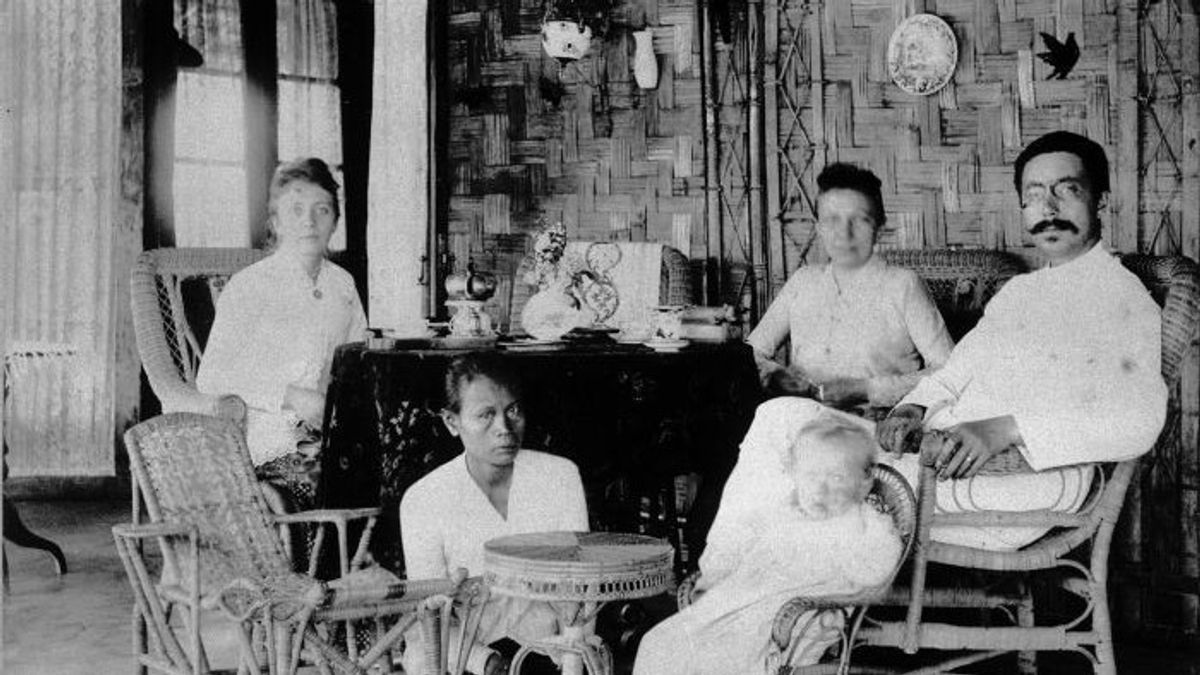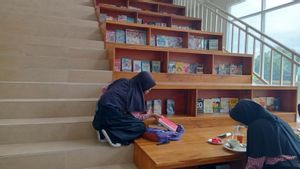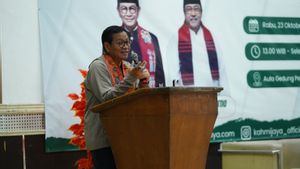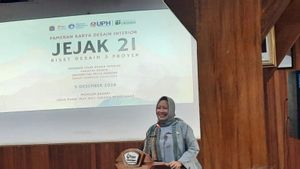JAKARTA - During the Dutch colonial era, wealthy Europeans mostly owned large houses and lived in luxury. Because of the size of the house and high prestige, most of them bought slaves to do a lot of housework. 'Jongos' refers to male slaves, and 'babu' refers to female slaves.
In the past, ideally a noble household and an official of the VOC trade association had dozens to hundreds of 'jongos' and 'babu'. Some were employed as cooks, gardeners, babysitters, and pekatik (horse workers).
A story comes from a wealthy landlord named Augustijn Michiels or who is familiarly called Mayor Jantje in the 19th century. Djoko Soekiman, in his book Indies Culture (2011) explains, in 1831, Major Jantje's household needed 320 slaves. 30 of them served as versatile musicians.
"Besides that, there are four ronggeng dancers, two xylophone players, and two mask dancers. Even the Chinese also trained their slaves to become artists in the fast growing Chinese troupes of that era. Usually slaves who were good at dancing and singing were highly valued, ”said Djoko Soekiman.
Major Jantje also had slaves to take care of the stables. The total is 24 people. Apart from that, Major Jantje also employed a lot of budah to take care of the garden. There are five people in the jasmine garden, nine in the vegetable garden, and eight grass cutters.
Others, there are sewer supervisors, bird nest supervisors, cart carriers, and 117 babu in the house. Their jobs are washing, sweeping, mopping, cooking, or babysitting.
The term 'babu' was really popular back then. Until now, the Big Indonesian Dictionary (KBBI) still records the term 'babu' as a woman who works as a servant (servant) in people's households; housemaid; housekeeper.
The use of 'babu' diction is often found in short stories (short stories) that describe the period of the Indonesian colonial era. One of them is a short story by Chairil Gibran Ramdahan in the book Eleven Colen di Lebaran Night entitled No Mariam Di Jembatan (2008).
It is told in a short story set in the 1870s, a beautiful woman named Aria who is still 16 years old is busy looking for work to make a living. The problem is, Aria doesn't have many skills other than being a 'babu' washing clothes, like her mother. Because of that, he then came to Villa Bintang Mas owned by a Chinese playboy , Oey added Sia, who happened to need a cleaning babu.
Unfortunately, Oey didn't really like making Aria a 'babu' because she was too pretty. Oey prefers Aria to be chanted. "If it bener be true, nyang means neng so my wife, of course I love going all-mua which neng kepengen. Neng will have money many ama all sorts of things, "wrote Gibran.
Aria refused. Even by spitting on Oey added Sia. Aria was then killed by the accomplice of this rich young man, Piun and Sura who were already hot. Aria's body, who only wanted to be a 'babu', was thrown into the swamp. Like suffering from karma, Oey was hanged a few years later in 1873 because he was caught killing a man because his mother was jealous of being approached by a man.
The origins of 'babu'
As stated by Hairun Salim HS in his writing in Tempo Magazine entitled From Babu to Domestic Work (2013), the famous term 'babu' was used before the 1945 war of independence.
"I noted that among the words that are no longer used are 'babu': female domestic servants, according to the Big Indonesian Dictionary (2007), which more or less continues the meaning put forward by WJS Poerwadarminta (General Indonesian Dictionary, 1952) as a female servant, taking care of the room, nursing children, washing. "

However, the word babu seems to have disappeared because it is rarely used. Many people believe that the term 'babu' contains a heavy element of humanity. 'Babu' is widely recognized as a derogatory and discriminatory term, so it deserves to be removed from civilized speech.
For details, we tried to contact the Makassar State University anthropologist Dimas Ario Sumilih. Dimas explained, the word 'babu' is closely related to the period before independence, to be precise during the reign of Governor General Herman Willem Daendels (1808-1811).
"In his time, a pivot road was built on the island of Java which is known as Jalan Raya Pos Daendels, Anyer Panarukan. In order to complete the project, workers who were later named as 'babu' were used. So that 'babu' at that time was defined as native workers who were worked by force. Therefore, in my opinion, 'babu' has the same meaning as slave. Both of them are manual laborers and forced laborers, ”said Dimas, who was contacted by VOI , July 12.
Thus, both slaves and 'babu' tended to work for individuals or certain families and groups. They were forced to work as manual laborers at the will of their owners, until finally some of them could be bought and sold following the trend of the era.
Because of this, Dimas revealed that if 'babu' is understood to be broader, people must look at their own environment. “Sometimes we don't realize that maybe we are 'babu' or slaves of other nations. when we don't control, for example, hedonism or spree. I think that is part of slavery or slavery in disguise. "
Because, in the hedonistic lifestyle, the thing that is most needed is none other than fulfillment and fulfillment. If this is the case, it's no wonder that secretly those who perpetuate hedonism can be said to be the 'babu' of the satisfying tools, or even the 'babu' of the nations that monopolize these satisfying tools.
"Therefore, national figures, especially in the past, Bung Karno, gave advice and warnings, that we should not become 'babu' in our own country, or among existing nations. The direction, among others, is there, and that is the importance of us opening up broader meanings, ”Dimas concluded.
The English, Chinese, Japanese, Arabic, and French versions are automatically generated by the AI. So there may still be inaccuracies in translating, please always see Indonesian as our main language. (system supported by DigitalSiber.id)









